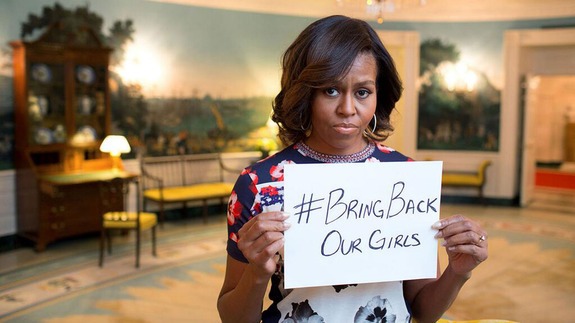As my colleague Adam Nossiter reports from Nigeria, President Goodluck Jonathan’s government is under intense pressure to respond to the mass kidnappings of hundreds of schoolgirls by Islamist militants over the past month. Public outrage over the abductions, and the apparent inaction of the authorities, first expressed in small street protests, has been greatly amplified on social networks, where more than a million messages have been tagged with the simple demand: #BringBackOurGirls.
The social media campaign, apparently inspired by impassioned remarks from Nigeria’s former education minister, Oby Ezekwesili, has gathered so much momentum that, according to the BBC Trending blog, about 44 percent of the tweets posted this week have come from the United States, twice the number coming from Nigeria.
Some activists celebrated the campaign’s success in making the abductions a central focus for the international news media — and prompting the first public comments on the case from President Jonathan, as well as offers of assistance from the United States and Britain.
But close observers of social media trends, like the Turkish sociologist Zeynep Tufekci and the Sudanese writer Nesrine Malik, pointed out that there were limits to what hashtag activism, like bumper stickers and T-shirts, can achieve.
Another observer, the Nigerian-American novelist Teju Cole, warned on his Twitter feed against the temptation to lose, in “the fervor of our hashtags,” an awareness of the complexity of the issues involved.
Mr. Cole also pointed out that Secretary of State John Kerry, who said that the United States was “working to strengthen Nigeria’s institutions and its military to combat Boko Haram,” was, just last year, expressing his deep concern at “credible allegations that Nigerian security forces are committing gross human rights violations” as they combated the Islamist militants.
In a post for The New Yorker’s literature blog, Mr. Cole filled readers in on some of the recent history of the conflict between the state and the Islamists as he tried to imagine what the abducted girls might be going through.
In the town of Chibok, the girls, mostly sixteen or seventeen, had been cautious. They knew, as everyone did, that schools were being targeted. About forty boys had been killed at a school in Yobe last July. They’d been lined up in their dorms and shot. In the same state, twenty-nine others had died in February, their bodies burned, the culprits never found. And so the girls had come back to Chibok only for their exams — a quick, calculated risk before they returned home.
Where are they now? The shock of a sudden captivity will have given way to other fears. There are more than two hundred of them, Muslim and Christian. Nigeria’s northeastern border is massive, porous. They don’t know when they crossed the border, or if they crossed the border. They could be in Niger, or Chad, or Cameroon (these three neighboring countries are impoverished states with weak security). The girls know only what their captors say. They have lost track of time. But they feel, in their bodies, the distances covered by the rumbling trucks. They cannot imagine what the world is thinking about them, or if it is.
And what are they themselves thinking of, huddled in their dozens, warned to stay quiet? Not of the murders of Boko Haram’s founder and some of his followers by Nigeria police five years ago, which sparked the violent phase of the group’s campaign of terror. Not of the thousands killed during that campaign, in suicide bombs, attacks on churches, and shootings at restaurants, a frightening catalog of atrocities. Not of the global war on terrorism, nor of America’s strategic goals in that war. (Already, in Niger, a drone base is assembled; already American specialists are on their way to help the Nigerian government.) Not of Baga, some two hundred miles from Chibok, where last year government forces massacred two hundred civilians, nor of Maiduguri, where, in mid-March this year, more than five hundred men were executed on suspicion of being terrorists. Not of Abuja, where bombs now explode with unnerving frequency. Not of next year’s elections, which the President wants to win at all costs, nor of the corruption fueling his reëlection bid.
They are not thinking of Twitter, where the captivity is the cause of the day, nor of the campaigns on the streets of Lagos for a more competent and less callous government, nor of the rallies in front of Nigeria’s embassies worldwide, nor of the suddenly ramped-up coverage by international media, nor of how this war will engulf even those who are only just beginning to hear about it, nor of those who, free for now, will someday become captives.



Leave a Reply